This is a supplement to our overview of “Jane’s World,” which summarizes the politics, class, and economic pressures that characterized Regency life.
Many of the struggles in Austenland have to do with class structures, which had been historically tied to heredity, but, by the early 1800s were increasingly influenced by matters of relative poverty or wealth.
This survey of the class structures and potential mobility reflected in Austen’s novels will by necessity include omissions and overgeneralizations, but it does provide a framework for understanding some of the class conflicts that motivate many of Austen’s characters.
The Titled – At the top of Austen’s spectrum are the titled, including the dowager Viscountess Dalrymple, Lady Catherine de Bourgh (daughter of an Earl), and Baronet Sir Walter Elliot.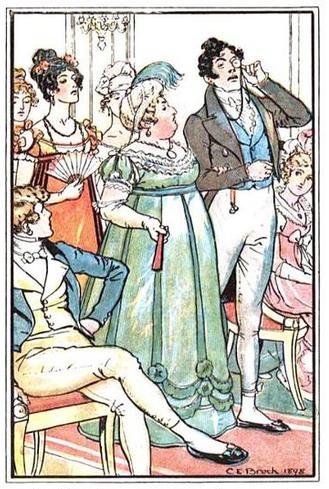
Note that, with the exception of Viscountess Dalrymple (a very minor character included mostly to show Sir Walter’s social aspirations), none of Austen’s characters belong to the higher “peerage” classes which include duke, marquess, earl, viscount, and baron.
A little closer to the ground were people with “knighthoods” like Sir John Middleton (who may have earned his title and at least some of his wealth during his military service), Sir Thomas Bertram (who augments his wealth with overseas business interests), and Sir William Lucas (who earned the title through financial and political achievements, though the title itself seems to have brought him little more than bragging rights).
The “Landed Gentry” – The vast majority of families/patriarchs represented have no title at all. Most, like Darcy 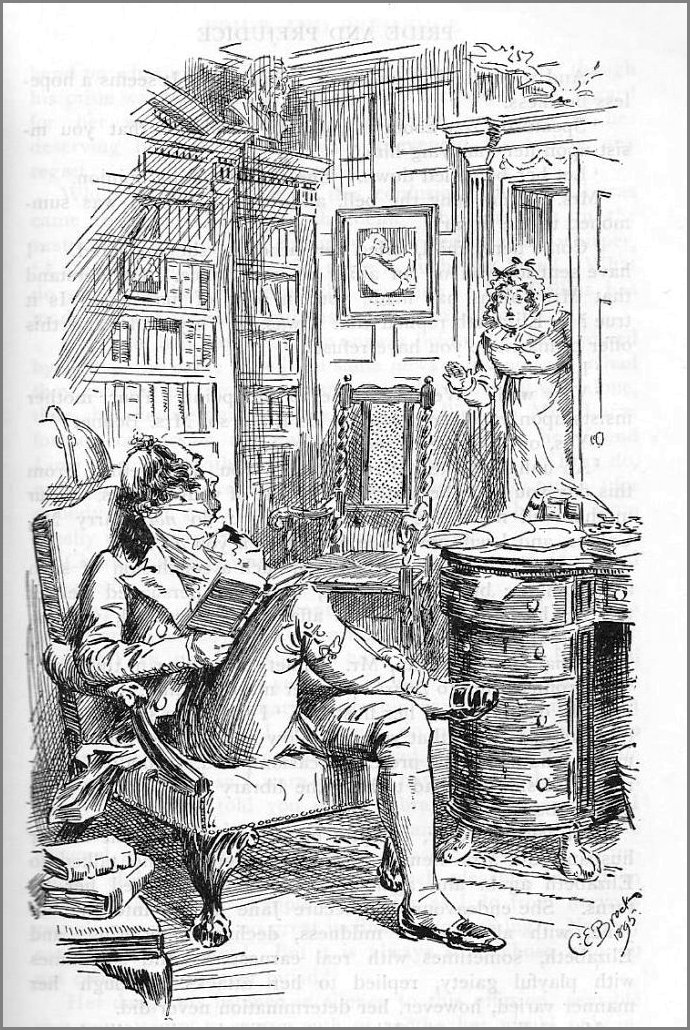 (who for all his wealth is not titled), Mr. Bennet (shown at the right), and Mr. Woodhouse, are “landed gentry,” having inherited estates that provide enough income for a “gentle” lifestyle, as well as the responsibility to keep their estates solvent enough to pass down to their heirs (though some of the patriarchs are better at this than others.)
(who for all his wealth is not titled), Mr. Bennet (shown at the right), and Mr. Woodhouse, are “landed gentry,” having inherited estates that provide enough income for a “gentle” lifestyle, as well as the responsibility to keep their estates solvent enough to pass down to their heirs (though some of the patriarchs are better at this than others.)
The heirs and heiresses who own no property but have a large income stream also circulate at this level. Bingley and Sophia Grey are in this class. That said, if the heiresses are wealthy and attractive enough to earn the attention of a titled gentleman, no one would censure that marriage.
“Tenants” – On the estates, the next level “down” chiefly involves 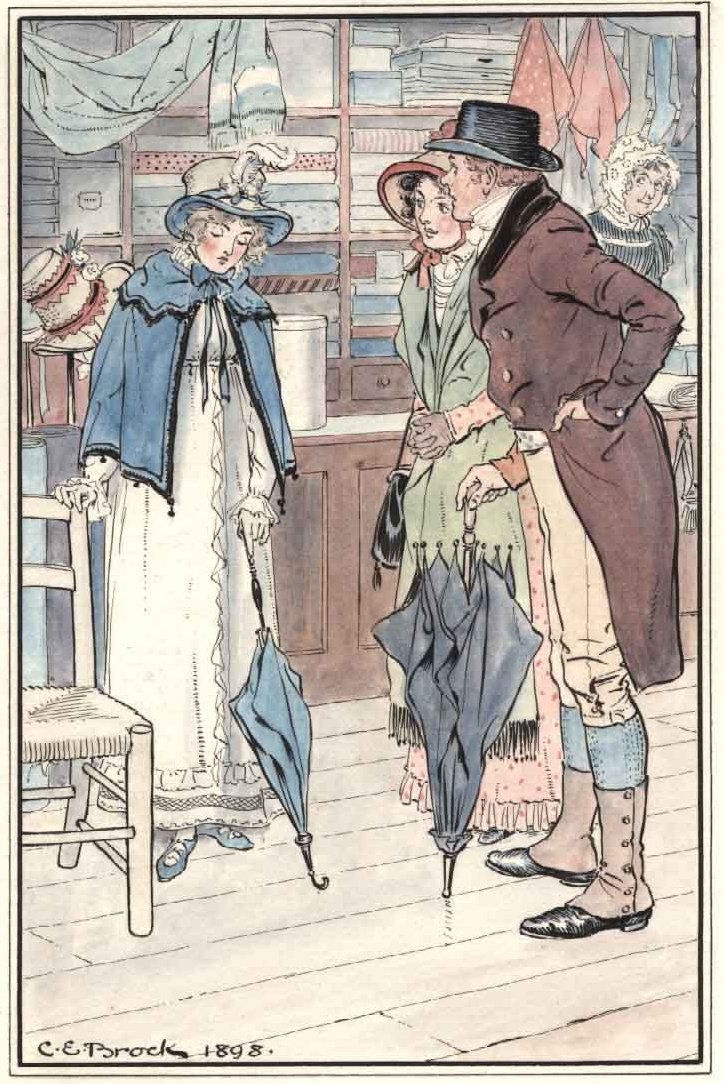 the tenant farmers, most of whom work land belonging to the estate in return for a place to live and the right to keep the benefit of excess profits for themselves. This is a throwback to feudalism, of course, but it continued into the 20th century, as seen in Downton Abbey.
the tenant farmers, most of whom work land belonging to the estate in return for a place to live and the right to keep the benefit of excess profits for themselves. This is a throwback to feudalism, of course, but it continued into the 20th century, as seen in Downton Abbey.
Robert Martin (shown at the right) is the only major character from this class. On the other hand, his landowner Mr. Knightly, considers Martin more of a “gentleman farmer,” and the Martin home seems relatively prosperous – with two parlors!
Ironically, Sir Walter introduces Admiral Croft – a man wealthy enough to afford life on Sir Walter’s estate when Sir Walter could not – as his “tenant,” implying that Croft is beholden to Sir Walter, not the other way around.
Independent Middle Class – Away from the estate, there are a number of folks who could be considered “middle class.” Lawyers, tradesmen, businessmen and others. Mr. Phillips (brother-in-law to Mr. Bennet) and John Knightley (Emma’s brother-in-law) are both lawyers who fall into this category.
The Nouveau Riche – Sometimes, the despised class of “tradesmen” encroach on the landed gentry’s sense of propriety by becoming wealthy enough to aspire to local “society,” such as it is. Emma is inclined to refuse the invitation to the Coles’ party because they made their money through trade, then disappointed when the invitation is slow to arrive. 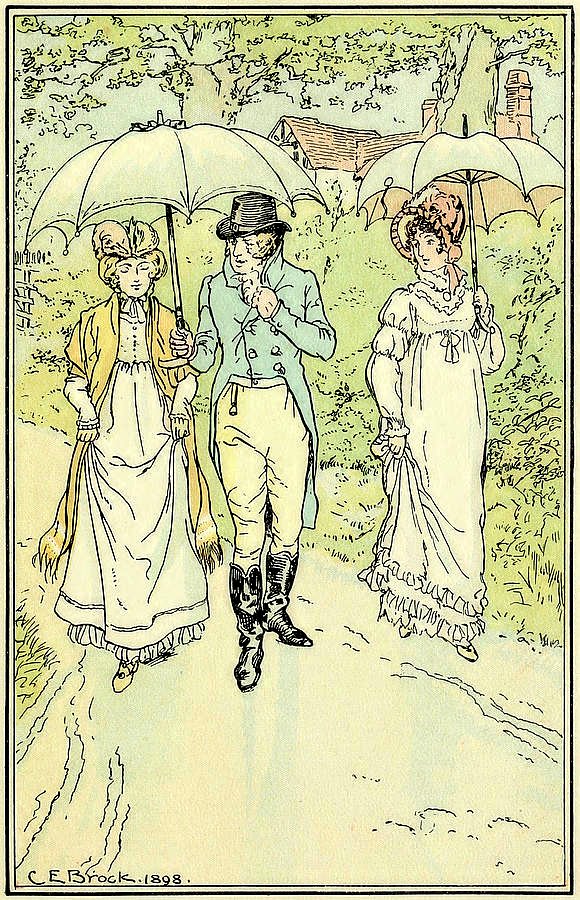
On the other hand, Mr. Weston (shown at the right) made his wealth through trade, but becomes a close family friend to the Woodhouses. Admittedly, this was largely due to his marrying Emma’s former governess and best female friend. And Emma was somewhat distressed that Weston didn’t mind mingling with people Emma thought were beneath her notice. But Weston has crossed an invisible barrier that the Coles have not.
In general, local prejudices against the “nouveau riche” conveniently ignore the fact that most of the untitled landowners (including Darcy) probably have ancestors who created their wealth by – gasp – working for a living.
The “Working Class” – Outside of their household servants or estate stewards, Austen’s characters seldom encounter people who are in “the working class” or even worse off. In part that may be due to the insular properties of living on country estates. It is certainly a contrast to Dickens, who could easily provide another ten or so levels of class stratification if we strove to sort out the factory children, the bankrupt “gentlemen,” the upstart law clerks, the derelicts, thieves, and others who populate Dickens’ works.
Wild Cards – There are two “wild cards” in Austen’s society: The military and the clergy. The military is a “wild card” because it provides a path to upward mobility regardless of ancestry. The clergy are a “wild card” because their roles often put them on familiar terms with the wealthy, no matter their ambitions for upward or (in at least two cases) downward mobility.
The Military and Upward Mobility – Illustrious military careers have presumably increased the wealth of Sir John Middleton and Colonel Brandon, elevating at least the latter to the de facto status of “landed gentry,” whatever his ancestry. 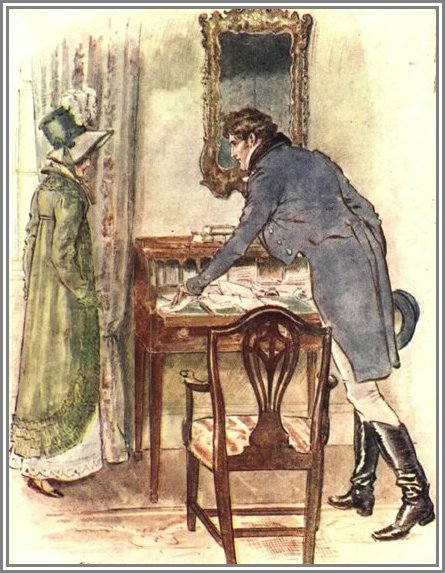
Captain Wentworth (shown at the right) has risen from obscurity to a respectable income by the same means.
At the same time, Sir Walter Elliot – a would-be social climber himself – despises the navy because it is “a means of bringing persons of obscure birth into undue distinction, and raising men to honours which their fathers and grandfathers never dreamt of.” It might be mentioned that his daughter Anne has no such compunctions.
The Clergy and “Sideways Mobility” – In Austen’s day, grand estates were usually passed in their entirety to the oldest son, which left younger sons scrambling for a living. The law, politics, or the military were all respectable options. But the least demanding career that was still considered “respectable” was entering the clergy, and hopefully being placed in a good position (called a “living”) with a generous estate owner, who owned the parsonage, and in many cases the church itself.
Note: I’m not recommending this system. It helped contribute to a high percentage of Anglican pulpits being filled by men who interest in religion was mostly a box they had to check to get a comfortable career for life. Which may partially explain why the vast majority of English today are either atheists or agnostics.
Back to Jane Austen’s day – you remember that she was the daughter of a vicar. So for her it’s a relatively positive outcome when you see Edmund Betram and Henry Tilney placed in comfortable “livings” on their fathers’ estates. If family feuds don’t get in the way, Edmund and Henry’s children will likely enjoy similar social standing and privileges as their cousins in the mansions across the green.
Life as a clergyman offered the chance at upward mobility as well – though Austen hardly rewards those on that path. If Wickham had seriously studied for the ministry and earned the “living” at Pemberly, it would have been a huge step up the social ladder for the steward’s son. This would have enabled him to raise a family in Pemberly’s social circle – no small accomplishment. (His profligate character cut off that path, of course). Mr. Elton hopes that ingratiating himself with an heiress will eventually lead him to control of her father’s estate (but Emma is no fool in that respect at least).
Conversely, Edward Ferrars wishes to avoid his responsibilities as the firstborn and sees the clergy as a preferable alternative. 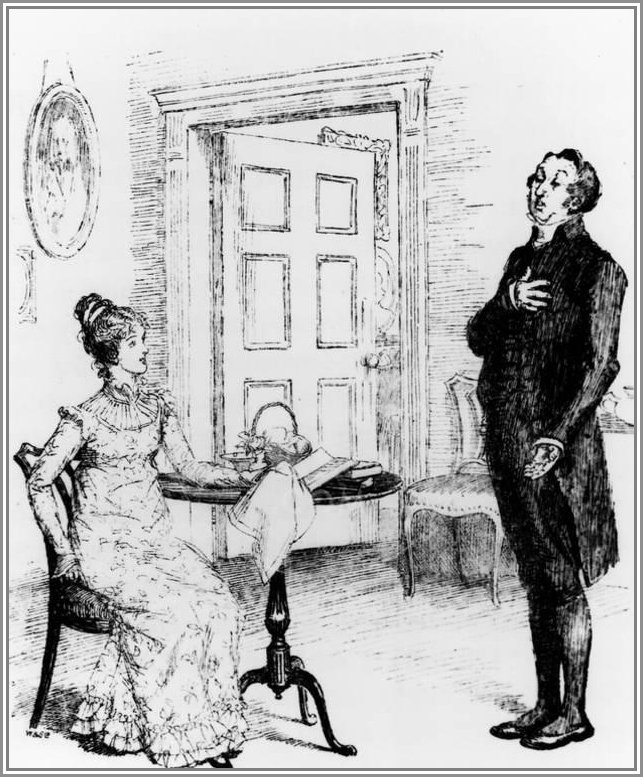
On a more-or-less sideways path is Collins, who is from a family that was once wealthy and who is destined to inherit the Bennets’ estate. Serving as a clergyman in the meantime seems only to aggravate his pompousity and his insatiable need for recognition by his betters.
For more details on the state of clerical careers during Austen’s day, check out our article “Austen and ‘The Ministry.'”
The Lines Aren’t Always Drawn Where You Might Think – For example, Darcy is far wealthier than his preposterous, demanding aunt, but he is lower on the social scale, since she is titled and he isn’t. When Elizabeth says, “He is a gentleman; I am a gentleman’s daughter,” she is telling the truth. Despite their massive differences in wealth, influence, and even decorum, Darcy and Mr. Bennet both belong to the same class of landed gentry.
So the rules don’t always work the way you imagine they would, or even the way Lady Catherine thinks they should, but they are among the many cultural frameworks that steer the characters into paths a modern writer or reader would not even imagine on his or her own,
